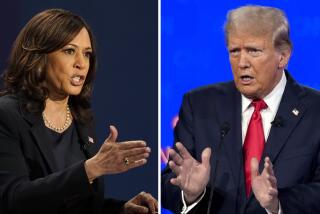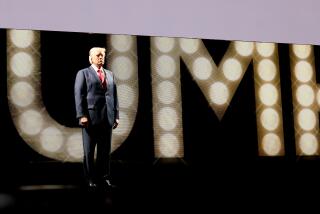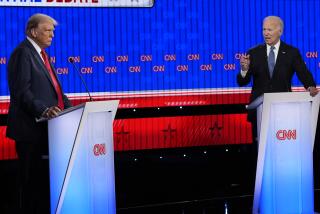Republicans’ ‘head vs. heart’ battle moves to Florida
With the presidential candidates bracing for another televised debate Monday night, a nomination fight that has suddenly swung Newt Gingrich’s way is playing out along a ragged fault line inside the Republican Party.
Gingrich routed Mitt Romney in South Carolina by both channeling and stoking the emotions of angry, economically stressed conservatives, who rewarded him by turning out in record numbers for the first Southern primary. Romney, his campaign back on its heels, is trying to convince Republicans that his cooler establishment mien is the surer path to victory in November.
On Sunday, Romney sought to smooth over what he described as “a setback” by announcing that he would make his 2010 tax return public Tuesday, along with an estimate of his 2011 taxes. His refusal to do so last week led a raucous debate crowd to boo him as he stood onstage.
“It’s a classic head versus heart battle,” said Whit Ayres, a Republican pollster.
As Romney and Rick Santorum arrived in Florida on Sunday, the question hanging over the Republican contest — and a GOP establishment increasingly concerned about Romney’s ability to close the sale — is whether the dynamics that emerged in South Carolina are irreversible, which would greatly complicate efforts to coalesce behind a likely nominee and pivot into the fight against President Obama.
Gingrich, scrambling to raise enough money to compete with Romney on Florida television ahead of the Jan. 31 vote, is counting on momentum and two debates this week to produce another come-from-behind victory in the year’s first big-state primary.
The emotions that Gingrich successfully exploited in South Carolina are also raging across Florida, Republican strategists say, as high unemployment and home foreclosures have dampened the once unquenchable optimism of Sunshine State voters.
David Johnson, a 20-year campaign veteran with ties to former Republican Gov. Jeb Bush, said the restive mood clearly favored Gingrich.
“It is the angriest Republican electorate that I’ve seen,” said Johnson, an advisor to former candidate Jon Huntsman Jr. who is now neutral in the contest. The same tinder that Gingrich ignited up the coast “is there to set fire to in Florida.”
With just nine days for candidates to make their case, Romney holds the upper hand, at least for now, thanks to a lopsided money advantage and groundwork laid since his 2008 campaign. But, Johnson said, “it’s going to be a lot harder for him” to connect with voters here on an emotional level.
“There’s nothing new about Mitt to a lot of these folks,” he said. “They know the Mitt story. The question is, are we going to go ahead and vote for Mitt, or are we still shopping?”
With his breakthrough South Carolina win, Gingrich, who likes to cloak himself in the guise of the professor he once was, articulated the gut-level frustration of voters whose alienation from Washington and resentment of East Coast elites in government and the media have hardened in difficult times.
Exit polls show that they are deeply worried about the economy of a country that, to them, has been living far beyond its means and drifting away from its traditional moorings regarding same-sex marriage and other social issues.
A challenge for the former House speaker, who has gained and lost the lead before, will be to avoid coming off as so angry himself that he self-destructs.
Romney, by contrast, is under intense pressure to at least neutralize the turbulent emotions that Gingrich has been able to exploit and to convince voters that he is the best candidate to defeat Obama — an argument that national polling data support but that South Carolina voters decisively rejected.
Romney’s weak performances in recent debates and longer-running inability to touch voters on a visceral level — what South Carolina Republican Sen. Lindsey Graham called his “passion deficit” — pose the most immediate threats to his status as the front-runner. On Sunday, Romney tried to make a virtue of his shortcomings, even as he responded with analytic dispassion to questions about how he let Gingrich outflank him.
“I’m not someone who is angry at — and mad, but I am very upset about the direction this country is headed,” the former Massachusetts governor said on “Fox News Sunday,” and he implicitly contrasted himself with an opponent who had a reputation as a Washington bomb-thrower.
“No one says to me that I’m someone that flies off the handle, that I’m erratic or incapable of dealing with stressful situations. People see me as a guy who’s calm under fire. I’ve been tested time and time again, had success, had some losses. I’ve learned from those losses, and I will show passion.”
He demonstrated that — perhaps not as he had planned — during a speech in Ormond Beach, Fla., where he sharply struck at Gingrich’s temperament and background. When protesters interrupted by chanting, “We are the people,” Romney shouted back: “These are the people; you’re the interrupters.... Take a hike.”
Gingrich, meantime, was more than happy to deconstruct his rival’s weakness. “I think the No. 1 thing people look for in difficult times is authenticity. They want somebody who is what he seems to be, somebody who’s comfortable with himself,” he said on CBS’ “Face the Nation.”
Gingrich said that because of what he described as Romney’s liberal record in Massachusetts, “he can’t relax and be candid.... And so I think he’s been dancing on eggs trying to figure out how to find a version of Romney that’ll work.”
Gingrich also tried to spin his own populist message forward into Florida.
What “nobody in Washington and New York gets is the level of anger at the national establishment — people who are just sick and tired of being told what they’re allowed to think, what they’re allowed to say,” he said on NBC’s “Meet the Press.” “As they look at the big boys on Wall Street, they look at the guys in Washington, they know none of that help got down to average, everyday Floridians, and I think that gap creates a real anger against the national establishment.”
He signaled his intention to keep exploiting the party divide by running as the enemy of the Republican establishment.
“Frankly, after the mess they’ve made of things, maybe they should be shaken up pretty badly,” Gingrich said, calling Romney the “clear establishment candidate.”
Two others remain in the race. Santorum, running an ardently conservative campaign, was blunted in South Carolina by Gingrich’s surge. The fourth candidate, Rep. Ron Paul of Texas, who embodies another strain of Republican thinking — libertarianism — will take part in both Florida debates but isn’t seriously contesting the state’s winner-take-all primary.
Santorum, who could help Romney hold off Gingrich if he can retain the support of evangelical voters, said he would keep going beyond Florida, regardless of the outcome. If so, the multi-candidate contest could stretch well into the spring, with unpredictable consequences for the fall.
“We don’t have to rush to judgment,” the former senator from Pennsylvania said on ABC’s “This Week.” “The longer this campaign goes on, the better it is for conservatives, the better it is for our party.”
Times staff writer Maeve Reston in Ormond Beach, Fla., contributed to this report.
More to Read
Get the L.A. Times Politics newsletter
Deeply reported insights into legislation, politics and policy from Sacramento, Washington and beyond. In your inbox three times per week.
You may occasionally receive promotional content from the Los Angeles Times.










